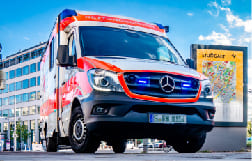Healthcare crisis: Germany invests in EMS Operators
Advanced training for emergency medical services (EMS) operators in Germany is a model of excellence and innovation. Here’s how these healthcare professionals are prepared to handle increasingly complex healthcare crisis.
At a time when the emergency medical system in Germany is under unprecedented pressure due to severe staff shortages and a dramatic increase in calls, it becomes crucial to realise the essential importance of advanced training for emergency medical service workers (EMS).
In this critical context, characterised by the need to provide rapid and high-quality care to patients in emergency situations, the training of EMS personnel emerges as an essential pillar to face this healthcare crisis in an effective way.
 |
Healthcare emergency in Germany |
More qualified personnel for more effective interventions
In Germany, training programs for EMS operators stand out for their excellence and innovation, combining key elements that position them at the top of this sector. These programs are characterised by the integration of rigorous requirements, highly realistic emergency simulations and advanced educational methodologies.
The training of EMS personnel plays a key role in ensuring rapid and effective responses in emergency situations. Thanks to their advanced training, EMS operators are able to expertly handle a wide range of scenarios, providing prompt assistance and life-saving interventions to people in difficulty. This is why investing in high quality training programs is essential to face current and future challenges in the field of medical emergency.

Strengths of EMS Training Programs
Training programs in Germany are often accredited by national institutes, thus ensuring curricula based on the best practices and the latest medical guidelines. This certification is crucial for maintaining high standards of competence in this field. The typical structure of such programs includes:

1. Advanced Course Structure
Advanced training programs for EMS operators in Germany are structured in a rigorous and comprehensive manner. They include specific modules covering a wide range of skills, from basic healthcare to advanced rescue procedures.
2. Specialisation
In Germany, EMS operators have the opportunity to specialise in specific areas, such as traffic accident rescue, mountain rescue, diving rescue, and more. This enables them to acquire specialised skills and to be prepared for particularly complex emergency situations.
3. Inter-professional collaboration
Advanced training programs promote interprofessional collaboration between EMS operators, doctors, nurses, and other healthcare professionals. This multidisciplinary approach enables them to acquire cross-cutting knowledge and develop interprofessional skills which are essential for providing integrated and coordinated care.
4. Continuous Training and Updates
Advanced training is not limited to the initial certification, but also includes continuous training programs and regular updates. EMS operators must attend refresher courses to keep up with new techniques, the latest medical guidelines and emerging technologies.
5. Innovative Methodologies
Finally, advanced training programs integrate innovative educational methodologies, such as simulation-based learning, the use of advanced technologies, and the integration of real case studies amidst the healthcare crisis. These methodologies encourage active and practical learning, enabling operators to acquire skills in an effective and lasting way.
Training for increasingly complex healthcare crisis
In summary, advanced EMS training in Germany is characterised by its rigorous structure, specialisation, inter-professional collaboration, constant training and the application of innovative methodologies.
These elements are crcial to ensure that operators are adequately prepared to face the complex and changing challenges of the EMS field, providing high quality care and saving lives in emergency situations.

